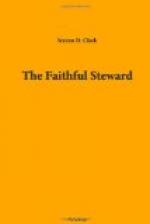In these last suggestions, a vital principle in systematic beneficence is developed, which challenges our special attention. It is, the duty of making provision for the dissemination of charity previous to the reception of our income. This is a point of immense importance, and may by no means be overlooked; though it is a point which Christians have too much lost sight of. They have been awake neither to the enjoyment nor obligations growing out of it. It is time that its solemn utterances should pierce the heart, and arouse the conscience of every follower of the Lamb, and startle him from his slumbers. They should reverberate through every dwelling in Zion. It is a principle of universal application. All, whether rich or poor, should make it an abiding rule of conduct. There is no difficulty in the way. While, of course, the rich should fix upon a higher proportion of income than the indigent, each one can decide upon some percentage adapted to his peculiar circumstances, and at stated periods lay up in store as the Lord prospers him. Every one, as St. Paul clearly taught the Corinthians, should have “a savings-bank” for charity.
The results of this principle would indeed be most happy, on whatever ground the previous arrangements should be made. In the first place, it would greatly increase the sum total of our contributions to the Lord. It would be acting on an acknowledged maxim in the acquisition of wealth. We know if we have a debt of ten dollars, an hundred dollars, or any sum within our possible ability to pay, the money will be by some means obtained; whereas, otherwise it will be extremely liable to be consumed in the ordinary flow of expenses. Thriving men, sometimes on this principle, keep constantly a little debt by the purchase of valuable property, knowing that it will stimulate their industry and frugality to meet the anticipated payment. Here men are not afraid to trust the past goodness of the Lord; why will they not be equally wise and confiding in the godlike work of benevolence?
It would also deepen our sense of personal devotement to Christ; leading us constantly to feel that our minds employed in planning, and our hands engaged in labor, are the Lord’s, and must be used in his service. It would likewise promote the ease and cheerfulness with which our appropriations would be made, and materially enhance our enjoyment, in a work which, though self-denying, brings us into intimate fellowship and cooperation with our blessed Lord. Even when engaged in our most ordinary avocations, it would induce the impression that we are laboring for Christ as well as for ourselves; and thus procuring the means of extending the glorious gospel, whose precious promises are our daily support and joy, and which opens to our view, beyond the skies, the crown and the harp, with which we hope to bow before the throne, when our bodies are crumbling in the grave. What greater happiness can the Christian experience on earth than the continued consciousness of co-working with his Saviour in diffusing through the world these richest enjoyments of our being, and kindling anthems whose enrapturing notes shall never falter?




